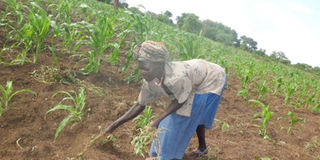Refugee strikes gold in farming

Mary Yangi in her maize garden. She has thrived on renting land from her neighbours so she can expand her farm. PHOTOS BY LOMINDA AFREDRARU
What you need to know:
- Mary Yangi left South Sudan during a civil unrest and when she was lucky to take over her mother’s land, she put it to good use, writes Lominda Afedraru
When one is watching news on TV or reading news on print media about the plight of refugees from South Sudan, the common thing you will see is families leading a difficult life. The story is, however, not the same for Mary Yangi, who has found refuge in Ngurua Village, Arua District.
The 59-year-old widow is earning from mixed farming. When you visit Yangi’s home, you will be welcomed by a jolly woman emerging from a grass-thatched house. The homestead is surrounded by a healthy-looking maize garden. It is hard to believe Yangi is a refugee.
The beginning
Yangi’s journey to successful farming has been gradual. On her farm, she rears goats, grows maize, Simsim and groundnuts.
“I am a native of Moli Village in Nimule South Sudan. I came to this village in 2014 during the first insurgence in my country and I decided to settle here in Siripi Refugee Camp,” she narrates.
She adds that in the beginning, things were not easy until she decided to relocate to a piece of land that had been allocated to her mother.
“My mother went back to our village in 2007 when the country had stabilised and that is when I decided to venture into farming mainly so that I could provide food for my family.”
Yangi, who lost her husband in 2005, has five children but also takes care of two orphans.
Before she started farming, Yangi and other refugees depended on food given to them by the United Nations Commission for Refugees (UNHCR).
Along the way, she got acquainted with different farmer groups and because she had some farming experience, she decided to join.
She became a member of ‘God help us women farmers and savings group’, where she is the chairperson.
Finding support
In 2015, Food and Agriculture Organisation (FAO) gave them improved longe 6H maize and Serenut groundnut seeds, which the farmers are planting to date.
The Danish Refugee Council gave the 20-member group a revolving fund of Shs2m. The members are entitled to borrow Shs300,000, which is payable in three months.
“I have a younger sister living in the US and when she heard that I was a refugee in Uganda, she sent me Shs100,000 to feed the children but I instead used it to purchase a female goat,” Yangi confesses.
The goat bore twins and she named one Choki, after her sister and the other Museveni, because she lives in Uganda.
When the revolving fund initiative started in 2015, Yangi borrowed money to start a food business and she used the profits to buy more goats. She now has 30 goats.
Maintenance
Yangi’s goats are on free range grazing system and they barely fall sick. As they keep multiplying, she picks the mature ones and sells them at between Shs70,000 and Shs100,000, money she uses to pay school fees of the children.
Because of the good relationship she has established with her neighbours, she has permission to let her goats graze on their land. They are left to sleep under a raised shelter in the grazing field.
For her crops, Yangi has been renting an acre of land from each of the neighbours to grow her simsim, maize and groundnuts.
The harvest
Last year, Yangi harvested 230kg of maize seeds from one acre and she sold 200kg. Her main market is in a village located in Odupi, Terego County where she sells a kilogramme of maize at Shs1,500.
The group is saving money to purchase a grinding machine and Yangi is certain that they will buy the machine by the end of this year. This, she says, will help group members grind their maize and eventually earn better.
Agronomists from FAO have engaged the group members in planting maize. Previously some farmers used to broadcast maize seed in their farms but they were sensitised to plant in lines with spacing of 30cm by 30 cm.
Challenges
Although Yangi now has food security, her challenge is prolonged drought, which of course leads to the crops drying up. Pests and diseases also affect mainly the maize crop. A look at her maize field shows some plants are affected by the army worm.
Advice
Yangi calls upon fellow refugees not to rely on food rations from UNHCR but rather engage in agriculture on the available land allocated to them.
This, she said, will help solve the problem of hunger in refugee camps in northern Uganda.




